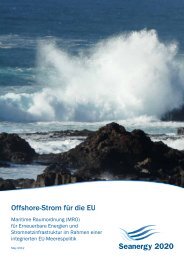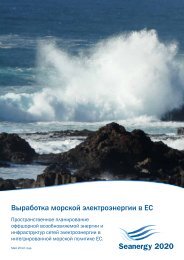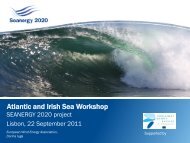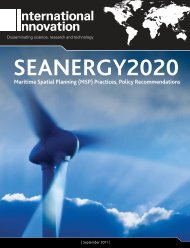Comparative analysis of Maritime Spatial Planning ... - Seanergy 2020
Comparative analysis of Maritime Spatial Planning ... - Seanergy 2020
Comparative analysis of Maritime Spatial Planning ... - Seanergy 2020
You also want an ePaper? Increase the reach of your titles
YUMPU automatically turns print PDFs into web optimized ePapers that Google loves.
undertaken like the „North Seas Countries Offshore Grid Initiative‟, ENTSO-E and the PentalateralEnergy Forum. These cooperation initiatives are all focused around the grid aspect <strong>of</strong> OREdevelopment. Ireland, the UK and France have joined most <strong>of</strong> these initiatives.2.6.3 Policy recommendations• In order to match current and future MSP developments with the necessary grid connections andreinforcements, it would be useful to present and discuss current and future MSP related to OREwithin the international or regional „grid‟ organisations such as ENTSO-E and other initiatives.2.7 IMPLEMENTATION OF MSP2.7.1 Barriers and obstaclesA comprehensive MSP policy has not yet been implemented in the Atlantic Ocean and Irish seas,except for the UK side <strong>of</strong> the Atlantic and Irish coast. One <strong>of</strong> the reasons may be the vast maritimespace <strong>of</strong> this sea basin and, compared to other sea basins like the North Sea and the Mediterranean,the relatively low density <strong>of</strong> maritime activities. One could say that MSP in such a context is a „nice tohave‟ policy but not a real urgent priority.2.7.2 Good practicesNevertheless, MSP or MSP-like instruments may be useful or even necessary, especially in theterritorial seas <strong>of</strong> this sea basin. France is expected to implement its ORE zoning policy also in theterritorial seas at the end <strong>of</strong> this year. It remains to be seen whether the other limiting conditions <strong>of</strong>the tender for the wind energy zones will attract sufficient ORE developers. A comparable, thoughless participative ORE zoning practice, is also in place in Portugal (in progress), Spain and Ireland.The UK has an interesting criteria based approach for <strong>of</strong>fshore wind development, which, a priori,does not exclude <strong>of</strong>fshore renewables from any maritime zone. This practice has the advantage <strong>of</strong>giving freedom to install ORE plants at a location <strong>of</strong> choice and the almost indefinite perspective forORE deployment in UK waters.2.8. CONCLUSIONThe table below gives a succinct overview <strong>of</strong> the MSP progress related to ORE development andtargets for <strong>2020</strong> in the EU member states <strong>of</strong> the Atlantic Ocean and Irish Seas. It illustrates that OREdevelopment has not yet really taken <strong>of</strong>f in this sea basin. In order to spur ORE deployment in theAtlantic Ocean and Irish Seas, it is important to adopt a MSP policy reserving the necessary space forthis new activity within the maritime area <strong>of</strong> a State.A comprehensive MSP legislation may not be necessary for this purpose. The ORE zoning approachcan turn out to be an equally effective MSP-like instrument if it has a legally binding effect.Deliverable D 2.366 | P a g e






